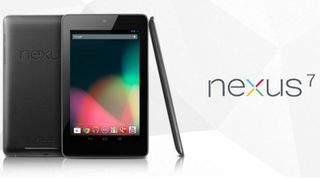Google 'wanted Nexus 7 to feel like a book'
Asus also working on multi-screen solution

The new Nexus tablet is impressive in a number of ways, with the 340g weight and pocketable size likely to entice many – along with the palatable £159 price point.
Tim Smalley, Asus' Digital Marketing Manager, told TechRadar that the design route for the device was carefully spelled out by Google:
"Although we're in partnership with them, Google wanted the device to feel like you're holding a book."
"This is why it weighs the amount it does, why it's balanced the way it is and why we have the tactile finish on the back. It's designed to inspire confidence in being able to hold the device just like you would hold a book – it doesn't slip around."
The microSD is sooooo 2011
However, one of the big criticisms of the new tablet was the fact the storage options were so miserly – with HD movies taking several GB of space, the 8GB variant of the Nexus 7 would become almost unusable as a movie machine.
Smalley believes that this is going to be a trend in all tablets soon, especially those running Android:
"The way the new version of the Play store works is that content is not always stored on device. You could purchase five movies from Google Play, but you're not going to watch all at once.
Get daily insight, inspiration and deals in your inbox
Get the hottest deals available in your inbox plus news, reviews, opinion, analysis and more from the TechRadar team.
"However, when you want them they'll be available, providing you've got a connection.
"And then when you're going away the content can be preloaded, so we think 16GB is a better solution.
"Once things like movies or books are finished with, they'll actually smartly remove themselves from your device; they're still available from your account but your storage isn't endlessly filling up."
Unwanted by Google
But why not chuck in an expansion port for those that want it? The Nexus 7 may support USB On The Go for flash drive plug ins (although this is yet to be verified) but a microSD card slot would surely sort this issue out?
"So there's two reasons [for no microSD slot] – firstly, to hit the price point. Secondly is the way Play Store is designed," said Smalley.
"The device was co-developed, but it's Google software at the end of the day and it's a flagship Jelly Bean device.
"Google is putting a lot of effort into content, and they believe they've got a very good proposition; so they're trying to push the idea you don't need to store content on the device."
To the cloud!
It also looks like Asus will be offering up a similar cloud-based solution in the past, as Smalley intimated during the briefing:
"[The cloud-based solution on the Nexus 7] is similar to something we're working on in addition to Google in the cloud space; the concept of having multiple screens able to access your content, effectively giving you limitless storage.
"The idea is you'll be able to drag content down when you need it, through Wi-Fi, LTE or wired connections."

Gareth has been part of the consumer technology world in a career spanning three decades. He started life as a staff writer on the fledgling TechRadar, and has grown with the site (primarily as phones, tablets and wearables editor) until becoming Global Editor in Chief in 2018. Gareth has written over 4,000 articles for TechRadar, has contributed expert insight to a number of other publications, chaired panels on zeitgeist technologies, presented at the Gadget Show Live as well as representing the brand on TV and radio for multiple channels including Sky, BBC, ITV and Al-Jazeera. Passionate about fitness, he can bore anyone rigid about stress management, sleep tracking, heart rate variance as well as bemoaning something about the latest iPhone, Galaxy or OLED TV.
